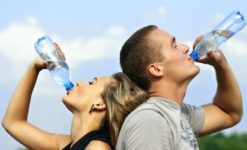Ask Mr. Pedometer and Friends…”Are you dehydrated? How do we know?”
July 24, 2019
A: Are you dehydrated? As we are experiencing hotter days of summertime, it’s important to stay hydrated and know the signs of dehydration. Here’s what Nancy George wrote in an article for everydayhealth.com:
“Dehydration, occurs when the body  has insufficient water and other fluids to function properly. This can lead to blood clots, seizures, and other potentially fatal complications. Studies have shown that even mild dehydration can have adverse effects on mood and energy. That’s why it’s so important to catch dehydration early on. Unfortunately, the signs aren’t always obvious ones like thirst and fatigue.” Here are some less obvious indicators that you might be dehydrated:
has insufficient water and other fluids to function properly. This can lead to blood clots, seizures, and other potentially fatal complications. Studies have shown that even mild dehydration can have adverse effects on mood and energy. That’s why it’s so important to catch dehydration early on. Unfortunately, the signs aren’t always obvious ones like thirst and fatigue.” Here are some less obvious indicators that you might be dehydrated:
-
BAD BREATH – “Saliva has antibacterial properties in it. Dehydration can prevent your body from making enough saliva. When you’re not producing enough saliva you can get bacteria overgrowth. One of the side affects of that is bad breath from chronic dehydration,” says John Higgins, MD, associate professor of cardiovascular medicine at the University of Texas in Houston, and chief of cardiology at Lyndon B General Hospital.
-
DRY SKIN – “A lot of people who get dehydrated are really sweaty. Going through the various stages of dehydration, you become very dizzy, and you don’t have enough blood volume so you get very dry skin,” Dr. Higgins says. He adds that because the skin is dry and not evaporating as well, you can also experience flushing of the skin.
-
MUSCLE CRAMPS – “The hotter you get, the more likely you are to get muscle cramps. This is from a pure heat effect on the muscles. As the muscles work harder and harder, they can seize up from the heat itself. Changes in the electrolytes, changes in the sodium and potassium can lead to muscle cramping as well,” according to Higgins.
-
FEVER AND CHILLS – “It might sound counterintuitive but if your body is severely dehydrated you may experience symptoms like fever or even chills. Fever can be especially dangerous, so be sure to seek immediate medical attention if your fever rises over 101 degrees Fahrenheit.”
-
FOOD CRAVINGS, ESPECIALLY FOR SWEETS – “When you’re dehydrated, it can be difficult for some nutrients and organs like the liver, which uses water to release some glycogens and other components of your energy stores. The result is that you actually can get cravings for food,” Dr. Higgins says. Causing you to crave anything from chocolate to a salty snack. Cravings for sweets are more common because your body may be experiencing difficulty with glycogen production, he says. Snacking on fruits and vegetables with high water content can help. (Cantaloupe, strawberries, watermelon, cucumber, celery, zucchini, tomatoes, and bell peppers are suggested). Yogurt also can supply helpful water.
-
HEADACHES – “The brain sits inside a fluid sack that keeps it from bumping against the skull,” explains Higgins. “If that fluid sack is depleted or running low because of dehydration, the brain can push up against parts of the skull, causing headaches.” Drinking alcohol, energy drinks, or caffeine can cause dehydration.
-
COLORED URINE – “If you’re well-hydrated, your urine will be mostly clear with a tinge of yellow,” Higgins explains. “Yellow chardonnay and orange are the ‘warning’ colors to watch for. When your body is about three percent dehydrated, your urine will be noticeably yellow. Whereas when your body is about five percent dehydrated, your urine will appear chardonnay-colored. If your body is more than five percent dehydrated – which is considered severely dehydrated, – your urine will appear orange.”
As we “Walk ‘n’ Talk” together this summer, we can help each other recognize symptoms of dehydration. Bringing along a water bottle is a good idea if the forecast is for weather over 80 degrees during our morning walk time.